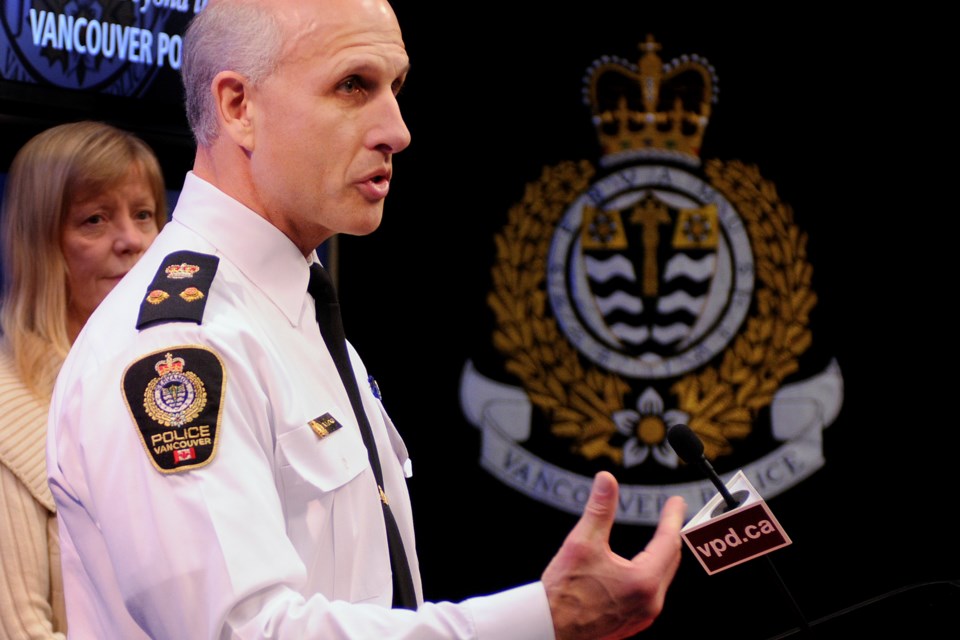The Â鶹´«Ã½Ó³»Police Department has recommended the Â鶹´«Ã½Ó³»Police Board dismiss a complaint from an anti-pot shop crusader accusing police of failing to shut down the cityâs 100 or so illegal marijuana dispensaries.
In a 15-page report that goes before the board Thursday, Deputy Chief Doug LePard provided a detailed analysis of the complaint from Pamela McColl of Smart Approaches to Marijuana Canada and outlined why the majority of dispensaries continue to operate without police interference.
âMarijuana dispensaries are illegal,â LePard wrote. âHowever, the issue of enforcement against marijuana dispensaries is a complicated one because of intersecting legal, social and political factors.â
The department has publicly stated that it does not consider enforcement against pot shops a top priority, saying the drug squadâs focus is on disrupting the trade of harder drugs such as heroin, cocaine and the prevalence of fentanyl, which recently caused several overdose deaths.
That position is reiterated in the report, although LePard pointed out that since 2013 police executed 11 search warrants at dispensaries, including one in August associated to the Hells Angels. The investigations resulted in 23 charges recommended against 11 suspects. Crown has, so far, approved 16 charges.
âThe reality is that the multiple search warrants executed and charges recommended have generally not resulted in dispensaries shutting down,â he said, noting one pot shop was raided three times but reopened after each investigation.
LePard said that in mid-2013, when approximately 27 pot shops were operating in Vancouver, police and senior staff at city hall discussed using existing city bylaws, complemented by police enforcement, to stop the proliferation of dispensaries.
At the time, he said, the city decided not to enforce bylaws and instead began to develop a set of regulations to issue business licences, which . Over that period, the number of pot shops increased to about 100.
âNow that the city has approved a regulatory scheme, it is expected that dispensaries that operate in a manner that generates police enforcement action will also not be in compliance with the cityâs new regulations, which can be used to shut them,â said LePard of the regulations, which include pot shops not allowed to operate within 300 metres of a school, have its operators subject to criminal record checks and pay an annual licence fee of $1,000 to $30,000, depending on whether the business is selling marijuana for  recreational or medicinal use.
In August, the from people wanting a business licence to operate â or continue operating â an illegal dispensary. The city has made it clear the bylaws are to regulate the business, not the marijuana. The city continues to process the applications.
In his report, LePard outlined the âsomewhat chaotic stateâ of the law regarding medical marijuana, which has led to confusion over what is legal and illegal, and seems to have been the catalyst for the proliferation of pot shops.
âIt is clear there is some genuine demand for marijuana for medical reasons, but it appears Health Canada-authorized suppliers have the capacity to meet the needs of those who have an authority to possess it for medical reasons,â he said. âAs one B.C. prosecutor wryly noted, âIf you look at the amount being sold by dispensaries, Â鶹´«Ã½Ó³»must be the sickest city in Canada.ââ
Added LePard: âThe reality is that some dispensaries are both part of a movement to push for legalization of marijuana for any purpose and are supplying what is obviously a large recreational market.â
In her complaint, McColl alleges police are disregarding Canadian drug laws and ignoring complaints from the public to investigate pot shops. LePard said the department doesnât disregard requests to investigate crime but pointed out Police Chief Adam Palmer must decide âhow to prioritize the use of expensive resources.â
To illustrate the cost, LePard broke down one case from a 2014 pot shop investigation, which resulted in four charges against two people. In total, 560 hours of police time was required, with a value of more than $34,000 in pay and benefits for the officers.
âOr stated another way, the investigation required the equivalent of one officer working full-time for approximately three months,â he said, noting it took three months for Health Canada to analyze the seized marijuana and marijuana-infused goods before the case could be forwarded to Crown.
The Courier was unable to reach McColl before this story was posted. Itâs not clear whether she plans to attend Thursdayâs police board meeting.
@Howellings



